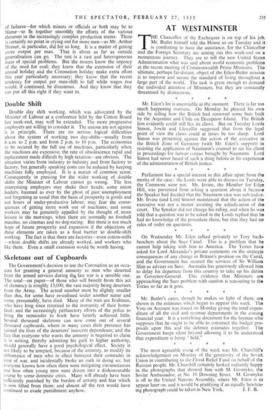AT WESTMINSTER
THE Chancellor of the Exchequer is on top of his job. Mr. Butler himself told the House so on Tuesday and it is comforting to have the assurance, for the Chancellor and the Foreign Secretary are setting out this week-end on a momentous journey. They are to tell the new United States Administration what was said about world economic problems at the recent meeting of Commonwealth Prime Ministers. The ultimate, perhaps far-distant, object of the Eden-Butler mission is to improve and secure the standard of living throughout a large part of the world. The task is great enough to demand the undivided attention of Ministers, but they are constantly threatened by distractions.
* * * * Mr. Eden's lot is unenviable at the moment. There is far too much happening overseas. On Monday he pleased his own side by telling how the British had removed some huts built by the Argentine and Chile on Deception Island. The British lion evidently could still flex its claws. But on Tuesday Lords Simon, Jowitt and Llewellin suggested that from the legal point of view the claws could at times be too sharp. Lord Simon was protesting against the action of the executive in the British Zone of Germany (with Mr. Eden's support) in resisting the application of Naumann's counsel to see his client in proceedings for habeas corpus brought by Naumann. Lord Simon had never heard of such a thing before in his experience of the administration of British justice.
* * * *
Parliament has a special interest in this affair apart from the merits of the case : the Lords were able to discuss on Tuesday, the Commons were not. Mr. Irvine, the Member for Edge Hill, was prevented from asking a question about it because the Speaker had decided that the Naumann case was sub-judice. Mr. Irvine (and Lord Simon) maintained that the action of the executive was not a matter awaiting the adjudication of the court. The Speaker did not change his ruling, and when he was told that a question was to be asked in the Lords replied that he had no knowledge of the procedure there, but that they had no rules of order on questions.
* * * *
On Wednesday Mr. Eden talked privately to Tory back- benchers about the Suez Canal. This is a problem that he cannot help taking with him to America. The Tories have asked for Lord Alexander's private comments on the strategic consequences of any change in Britain's position on the Canal, and the Government has secured the services of Sir William Slim as adviser on Suez. Australia has generously allowed him to delay his departure from this country to take up his duties as Governor-General. This evidence that Ministers are approaching the Suez problem with caution is reassuring to the Tories so far as it goes.
* * * *
Mr. Butler's cares, though he makes so light of them, are shown in the estimates which began to appear this week. The Vote on Account was issued on Monday giving the total expen- diture of all the civil and revenue departments in the coming financial year. It is a tantalising document for the layman who supposes that he ought to be able to construct the budget pro- posals upon this and the defence estimates together. The Government keeps silent beyond allowing it to be understood that expenditure is being " held."
* * * *
The most agreeable event of the week was Mr. Churchill's acknowledgement on Monday of the generosity of the Soviet Union in contributing to the Flood Relief Fund on behalf of the Russian people. Mr. Churchill certainly looked radiantly happy in the photographs that showed him with M. Gromyko, the Soviet Ambassador, at No. 10 Downing Street. M. Gromyko is off to the United Nations Assembly, where Mr. Eden is to appear later on, and it would be gratifying if an equally hearten- ing photograph could be taken in New York. .1. F. B.


































 Previous page
Previous page